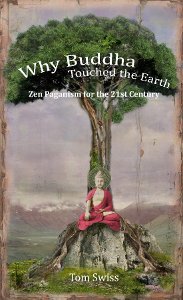Regular readers of our blog will be well aware that most of us here are interested in Pagan/Buddhist mash-ups. In light of my own adventures in Zen Odinism this recent publication by Tom Swiss was bound to be of real interest. Tom describes his own perspective as being that of a Discordian Zen-Pagan Atheist, and this book provides us with a fabulously personal exploration of where such a perspective may have come from historically and what it might mean to follow as a path today.
The shape of the book’s narrative is part travel journal, part religious history, and such a combination provides a pacey means for allowing insight into the way in which Swiss views the development of Zen Buddhist and Neo-Pagan religious perspectives. While his overviews of Buddhism and Taoism will provide little more than a good refresher for most, his analysis of how Buddhism interacted with the native paganisms that it encountered (Taoism in China, Shinto in Japan) is exceedingly helpful. In recognising this syncretistic dynamic, he then takes us on a whistle-stop tour of Buddhism’s journey to the West.
In examining sources as diverse as the New England Transcendentalists (Emerson, Thoreau, and Whitman et al), Theosophy and the role of Crowley, Swiss helps us see the key role that Buddhist Dharma had in allowing the integration of meditative practice and loosening the hold of Judeo-Christian exclusivity. The origins of Gardner’s Wicca and its impact on American Neo-Paganism are examined in some detail both in terms of its role in the emerging counter-culture, and in providing a spiritual perspective on ecological awareness.
Our author is keen to explore the connections between Zen’s renowned irreverence and the anarchic playfulness of Discordianism. For Swiss this is a key ingredient in avoiding “grey-faced” pomposity and literalism. The question of how we live in our World is too important to take seriously. For the Zen-Pagan, the importance of retaining our reason allows us to not only question and re-evaluate religious orthodoxies, but also allows us to burst the bubble of New Age Guru-dom.
As well as some good historical analysis he also provides the aspiring Zen-Pagan with some pointers as where to get started in their own practice. While not being overly prescriptive, he provides some good basics about sitting practice, chanting and the use of Magic – enough to inspire the imagination without drifting into an attempt to regulate.
The type of cognitive liberty that Swiss sees as innate to this type of creative hybridisation necessarily avoids absolutism and yet also asks us to seriously reflect on the ethical implications of awakening. I really enjoyed his reflections on sexuality and animal rights, and he manages to be at once provocative and challenging without being overly preachy.
While deeply personal, I felt that Swiss was dealing with weighty historical and religious themes and that his analysis is one that many will find helpful. As Western Paganism enters its third generation, it needs to ponder how it will seek to cultivate both psychological and ethical depth in seeking to answer human need. Buddhism has often proven itself to be “Pagan friendly” in that its apparent agnosticism provides enough theological space for the gods of the soil to inhabit.
For me the dialogue between Earth-based spiritualties and Buddhism is an on-going conversation rather than a “done deal”. The tension between these two different approaches is at times marked, but I for one feel that there is much to be gained in engaging with the creative frisson between such approaches.
As Western Pagans seek to reflect on what it might mean to seek “awakening” within their traditions, the type of conscious syncretism that Tom is proposing provides an interesting starting point. This is a highly readable and at times iconoclastic book that provides a good insight into the journey of a spiritually creative explorer.
Dear reader, I commend it to you!
SD


[…] Another review of “Why Buddha…” on Blog of Baphomet […]